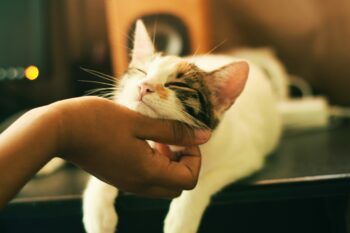Carefully observing your cat’s daily activities and habits is key to recognizing early signs of illness in your cat. Cats are stoic creatures, and disguising illness is a feline specialty, so your cat may be sick for days before you notice. Read on to learn more about when he needs medical attention. And remember to trust your feelings. If you think your cat needs to see the vet, he does. There is no substitute for good veterinary care.
- Watch your cat closely. Become familiar with his normal habits and patterns of activity, including sleep, eating, play, urination and defecation. The slightest variation may indicate the beginning of illness or disease.
- Ask the kids. They often observe things that busy adults overlook.
- Learn to monitor your cat’s heart rate and respiratory rate and to take his temperature. Normal is about 101.5 degrees F.
- Observe his normal respiration at rest: 20 to 60 breaths per minute. Cats rarely pant unless they are in extreme heat, overly excited, unduly stressed or in pain.
- Take note if your cat refuses food or water, is lethargic or seems reluctant to play. These are often the first symptoms of illness. Sick cats become dehydrated quickly, so a prompt response is essential.
- Take your cat’s temperature if he seems listless. Even the slightest elevation in temperature can account for a change in behavior.
- Call your veterinarian for advice if you notice symptoms such as sneezing, runny eyes or nose or labored breathing, which can indicate a respiratory illness.
- Be alert to coughing or hacking. These symptoms could mean just a hairball, but if they persist, call your veterinarian.
- Know that straining to urinate, especially in male cats, is considered a sign of urinary tract obstruction. Get medical help immediately, as this can be life-threatening. This is often accompanied by deep vocalization or howling and licking at the genital area. Urinary obstruction in male cats is life-threatening and should be treated as a true medical emergency.
- Be aware that violent retching, attempting to vomit or unusual panting are symptoms of serious illness or pain in cats, so call your veterinarian right away.
- Call your veterinarian as soon as you think your cat is sick. Delaying the call often leads to greater risk for the cat, prolonged recovery and increased expense.
- Use caution when handling a sick cat. He may react suddenly and bite or scratch when he normally would not do so.







